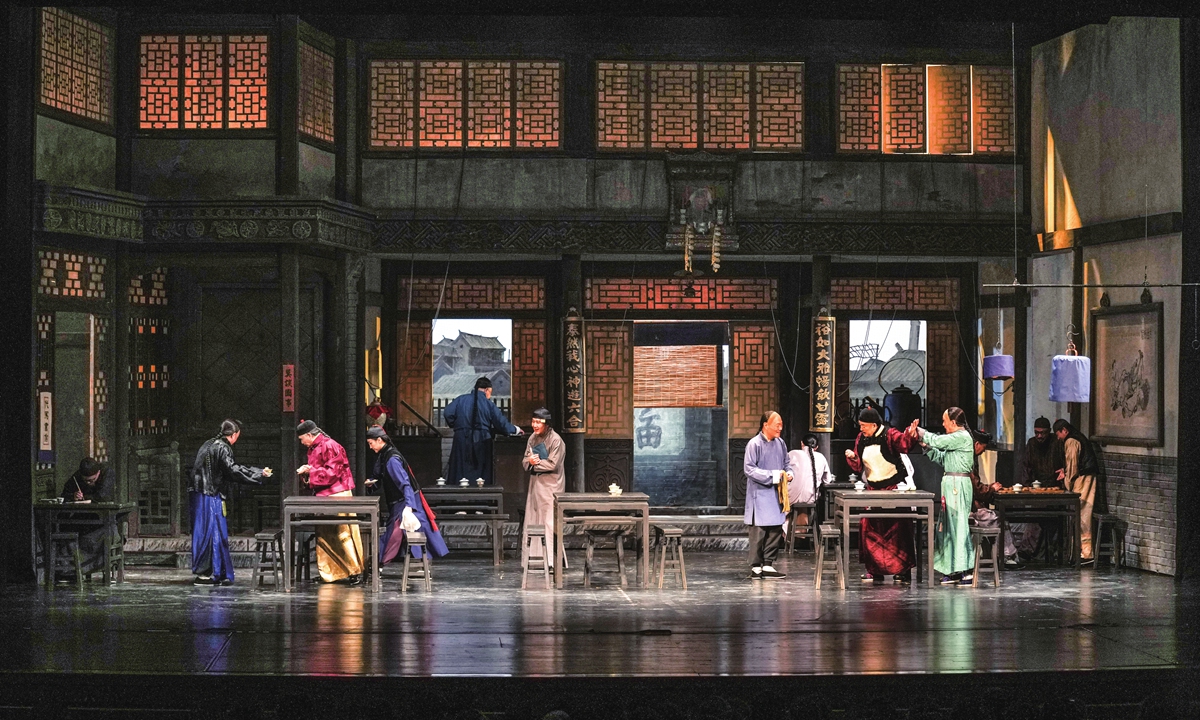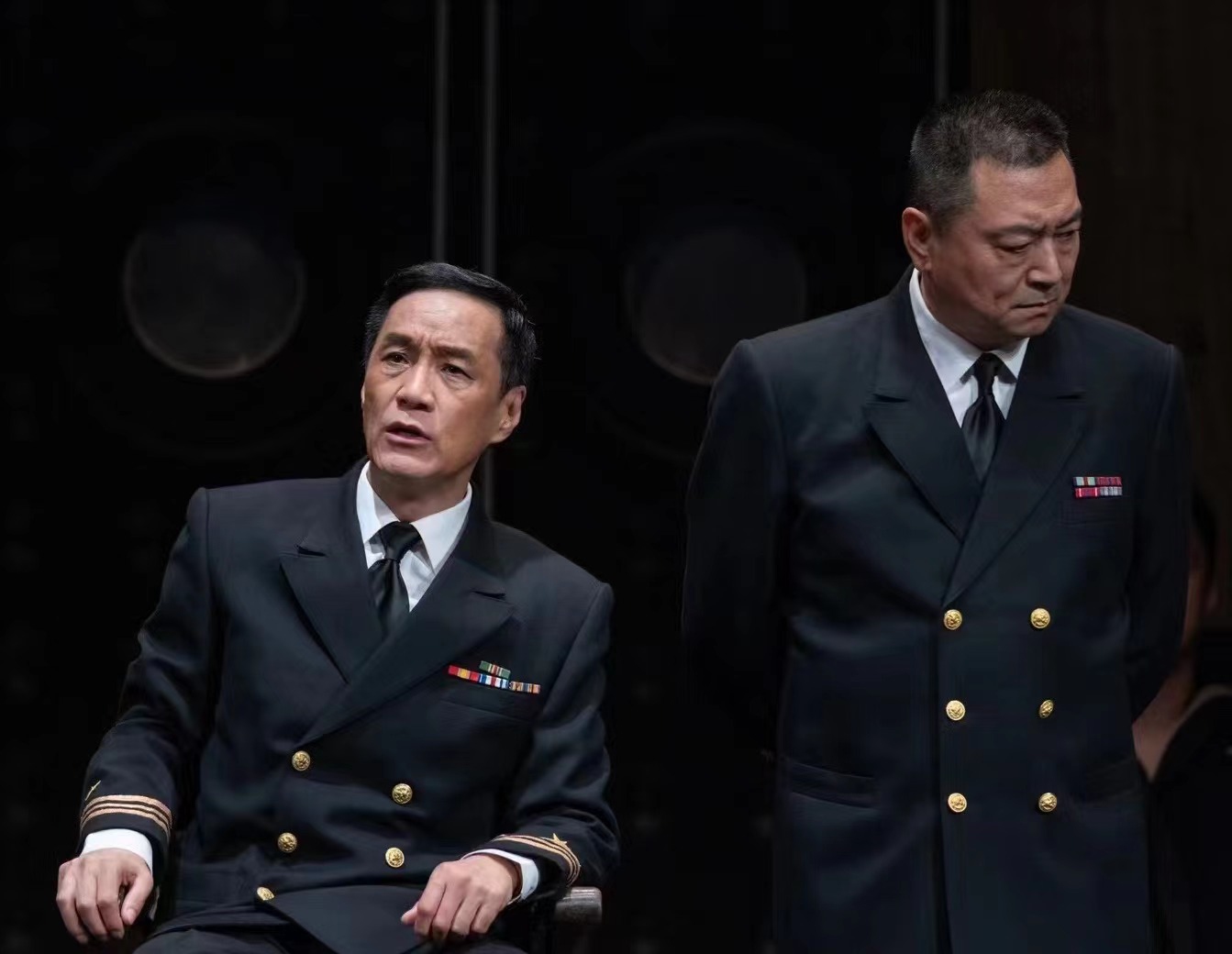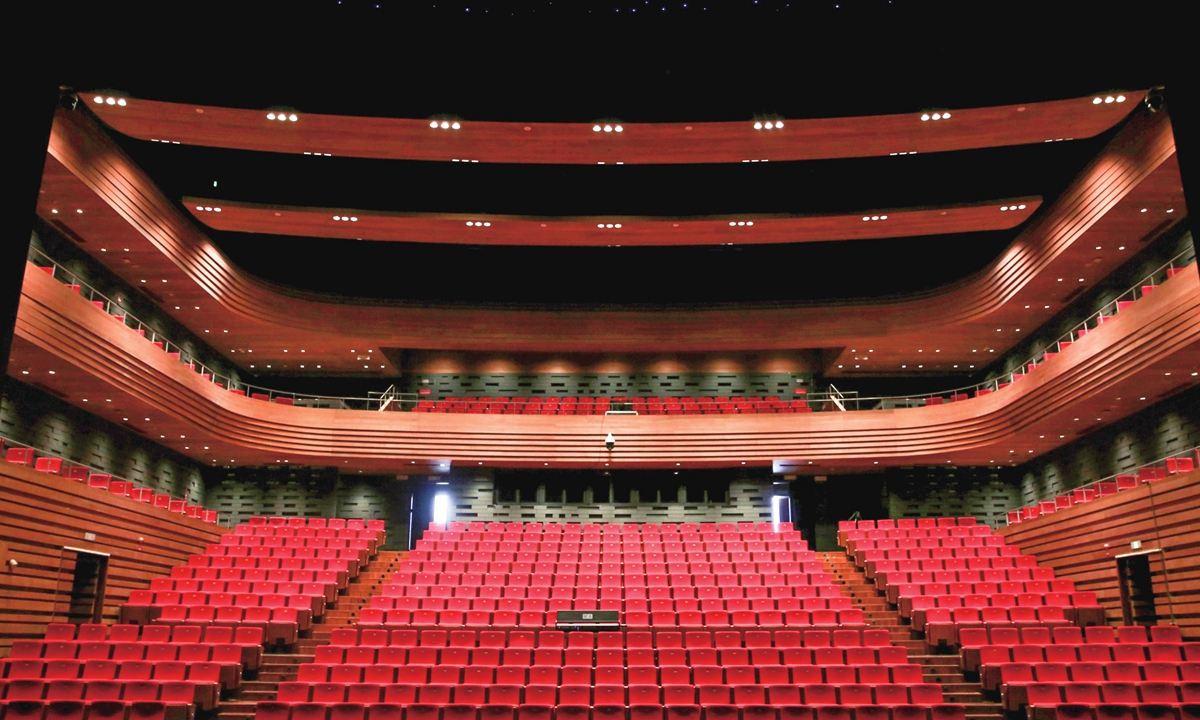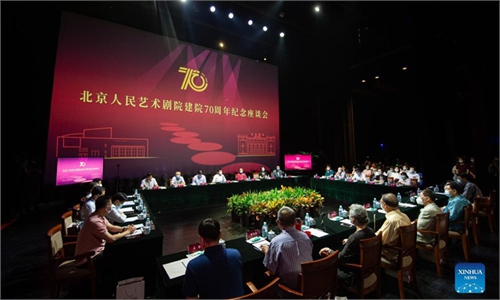ARTS / THEATER
On 70th anniversary, Beijing People’s Art Theater still shines with new, distinct Chinese characteristics

Actors perform a scene from the play Teahouse at the Beijing People's Art Theater. Photo: Xinhua
The sound of applause for the recent dramas The Caine Mutiny and My Poor Marat is still echoing on Chinese social platforms, while tickets for the upcoming show Old-Fashioned Comedy sold out as soon as sales began.
With the downturn of the global film and theater industries due to the raging pandemic, the spectacular online and offline performances held for the 70th anniversary of the Beijing People's Art Theater (BPAT) have become a bright light full of culture and entertainment for many young Chinese.
These young audiences cherish the opportunity to immerse themselves in theater performances and experience the impressive acting of the actors. Additionally, with the advent of livestreaming, they are finding newfound enjoyment in taking part in real-time discussions with other audiences while watching these dramas online.
Surprisingly, all three of the above-mentioned plays are from overseas. The Caine Mutiny, based on the novel of the same name by US writer Herman Wouk, was first brought to China in 1988 when the BPAT invited US actor Charlton Heston to direct the Chinese version of the play. My Poor Marat and Old-Fashioned Comedy are iconic works by the well-known Russian playwright Aleksei Arbuzov.
According to BPAT Vice President and famous Chinese actor Feng Yuanzheng, when the theater was established in 1952, its founding members included Chinese playwright Cao Yu and well-known director and drama theorist Jiao Juyin, who hoped it would become an internationally renowned palace of the arts like the Moscow Arts Theater.
"It is a source of pride that today, the Beijing People's Art Theater has become a first-class international theater and also developed a distinctly Chinese national artistic style," Feng told the Global Times.
How did the BPAT pave this unique and successful path? After seven decades of development, how has this theater dedicated to the "people" maintained its youth and vitality?
Passing on a legacy

Feng Yuanzheng (left) plays Captain Queeg in The Caine Mutiny. Photo: Wang Xiaoning/Beijing People's Art Theater
Feng, 59, who plays the lead role of Captain Queeg in The Caine Mutiny, remarked that the presentation of these classic foreign plays on the occasion of the theater's 70th anniversary represents the BPAT's unique concept of "localized second creation."
The distant background of World War II, the war of words of US officers in the courtroom, or the simple Russian romance in these classic foreign plays were not obstacles for Chinese audiences but rather became surprising sources of dramatic tension thanks to the vivid performances of the actors.
At the BPAT, when the director's bell rings, the usually lively rehearsal hall falls immediately silent, with the cast and crew quickly taking their positions.
"There are no celebrities but only actors here. Everyone is approaching the drama with a serious mind and the veteran actors also generously share their insight and experiences about their performances with their successors," Feng said.
Feng takes the training of actors seriously as he still follows the teachings he received himself as a young actor.
"When I first came to the theater, I heard that some colleagues whose loved ones had died or were seriously ill still performed their roles despite their grief, even putting on some cheerful plays on stage. The charisma they exuded, their handling of the roles in the plays and their seriousness about their profession profoundly influenced us," he said.
Feng emphasized that the heritage of the BPAT is also reflected in its realistic performance style that is close to the masses.
"The older generation of artists always taught us not to force a performance, but to learn to observe life and, more importantly, to become the character."
Realism, which is closely linked to the emotions of ordinary people, is the cornerstone of the BPAT style, the dramaturge noted.
Under the banner of realism, over the past 70 years the BPAT has carried out a diverse exploration of the art form, staging more than 360 dramas. Some of the highlights include plays like Longxugou, which reflects on the establishment of the People's Republic of China and brings new life to the toiling masses; Thunderstorm, which presents the tragedy of a 1920s bourgeois family in China through a strong feudal tone; and Teahouse, a graphic depiction of the fate of a group of street folk at a teahouse in Beijing over a 50-year period. Unlike Western high-end art, over the past decades the BPAT has produced a series of classic repertoires that ordinary Chinese people can understand and widely discuss, while at the same time introducing to the world several stories about China with distinctive Chinese characteristics, the expert said.
Since 1980, the BPAT has been showcasing Chinese novelist and dramatist Lao She's Teahouse in countries such as Germany, France, Switzerland, Japan and Singapore. Everywhere the production has gone, it has received rave reviews and many audience members even head to the theater wearing traditional Chinese clothing as a sign of respect.
"I clearly remember that in 2016, after the first performance of the play Zhiji (Confidant), which depicts the temperament and friendship of Chinese literati in the Qing Dynasty (1644-1911), at the Alexandra Theatre in St. Petersburg, the theater's artistic director excitedly ran backstage to tell us that it was the most beautiful play he had ever seen," Feng said, noting that the BPAT has always been committed to building a more open and international theater experience and living up to the expectations of the audience for this palace for the arts.
Courage to innovate
Insisting on inheriting the merits and original goals of the older generation of performing artists over the past decades has also given the BPAT the confidence and the courage to explore and do different things.
In recent years, the pandemic has inflicted a heavy blow on the performing arts industry, leading theater circles to actively think about and explore various ways to fight for a new space for theater to survive and thrive. BPAT is not lagging behind in this trend.
In 2012, a filmed version of the stage play Frankenstein, produced by the Royal National Theatre, was screened in China. In 2014, the BPAT Invitation Exhibition screened a high-definition version in theaters.
Feng noted that during BPAT's 70th anniversary, because of the sporadic outbreaks of COVID-19, the theater has chosen to make plays available online. For instance, from June 5 to 12, a recorded performance of Teahouse was livestreamed in 8K, earning more than 140 million views.
On the afternoon of June 19, more than 9 million people watched a live performance of the play Birdman online.
Although the theater has a large repertoire of Chinese and foreign classics, Feng pointed out that currently, the BPAT is sparing no effort to promote original plays.
"When major incidents occur in China, the theater always presents corresponding works with unique perspectives," Feng said, adding that their latest work, Community Council, reflects the efforts of China's grassroots to contain COVID-19.
"The BPAT has always stood at the forefront of the times, recording changes together with the audience," Feng said.
In recent years, the theater has staged a series of new versions of plays such as "youth" versions of Thunderstorm and Sunrise, all starring young actors.
"We can see many new faces with both vitality and acting strength," he said.
In September 2021, the Beijing International Theater Center officially opened, expanding BPAT's stage space to four stages and one charity theater.
"Seventy years is an old age for a person, but for the BPAT, it is a golden period of development. New theater, new repertoires and new actors mean new opportunities. We will continue to interpret the classics and explore infinite possibilities, taking the theater into the next 10 years with a more vigorous attitude," Feng said.

The Beijing International Theater Center Photo: IC

